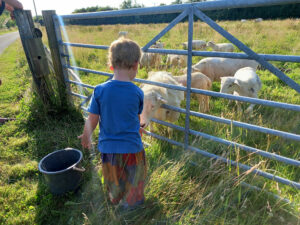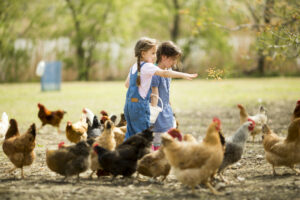Agritourism plays ‘vital role’ in educating the public, farmers say
17th March 2023
Farmers who run caravan, camping, and glamping sites have said the rise in agritourism is playing a vital role in educating people about where their food comes from.

Children staying at a working farm feeding the animals. According to farmers who run agritourism diversification projects, staying on a working farm is playing a vital role in educating the public about what farmers do and where their food comes from.
Scores of farm-based campsites sprung up across the UK during the COVID pandemic after the government extended Permitted Development Rights (PDR) and farmers sought to cash in on staycations.
As well as providing affordable getaways to some of Britain’s most beautiful countryside, farm-based holidays are also leading to other benefits for visitors and farmers alike.
The benefits of farm-based campsites
By staying on farms, people from non-farming and urban backgrounds are getting a first-hand glimpse into farming life and how the food they eat is produced.
This is leading to a greater understanding of the industry among the public, some farmers claim, and a greater appreciation for the hard work farmers carry out to produce food.
Oli Lee runs the Grassy Shire, a livestock farm, butchery, and campsite along with his wife Rebecca in south Leicestershire near Market Harborough. There the couple raise around 50 Shorthorn cattle and 900 Lleyn sheep which are butchered on site. A proportion of the meat is sold online and to campers during the summer. They secure many of the bookings for their site via popular online platform Pitchup.com.
Oli said visitors to the campsite often show interest in the farming side of the business, with around three quarters asking questions about what it entails.
He said: “Our campsite is on a meadow that doesn’t give a great return from traditional agriculture, so camping was a great solution. It’s not next to the yard or any serious farming action.
“But when visitors arrive, we make a concerted effort to ensure they feel welcome and understand their surroundings. Farming questions inevitably crop up. I would say three quarters of people who stay with us have conversations about farming and that gives us the opportunity to educate them on the basics.”
But Oli added that although it is important to talk about farming, it is equally important to talk about food, which their on-farm butchery enabled them to do.
“All of our sheep and cattle are pasture fed and butchered and dry aged on site,” he said.
“So we can talk people through that process and that completes the story. Once they’ve tried it, most people rave about it and they go away better informed about how the food they eat reaches their plate.
“We produce literature about our livestock to help educate people. It is all about education and with the campsite, we have an engaged audience who are generally eager to learn.”
Dave Gibson, who farms at Beltonville Farm, between Buxton and Bakewell in Derbyshire, agreed. Until two years ago, Dave kept a dairy herd but now finishes beef and sheep youngstock for prime markets, as well as running a large campsite of more than 100 tent pitches and 20 campervan pitches.
He said he was astonished at how little the general public knows about food and farming, and camping was a great way to help educate them.
He said: “It’s a great opportunity. Some people who come to the farm have never even seen a farm animal before. Some are so naïve, they don’t know milk comes from cows. They think it comes to the supermarket. They’re so disconnected from where their food comes from and farmers need to help educate them.
“The children are always interested. We have goats, hens, horses, sheep and cows and they love it. They love the tractors too.”
Dave, who also secures bookings via Pitchup.com, had been running a small campsite for around 15 years but expanded it to its current size during the COVID pandemic. However, his history in educating people about farming life stretches much further back – more than 40 years – to when school parties would stay at a local youth hostel and visit his dairy farm.
“The first lot we had visit us was when I was 18. I’m 60 now,” he said.
“We showed them how we got the milk from the cow and into the tank. Most of them had never seen anything like it before.”
John Stanyer, who farms at Wallace Lane Farm, Wigton, said a lot of people go to stay on a working farm with a romantic view of what farm life is like. But he added they often come away from his farm – a hill farm in west Cumbria where he raises rare breed sheep and free range chickens – with a better understanding of the stark challenges some farmers face.
John said: “It’s certainly true that staying on a farm campsite can teach people about farming.
“Around here we have people making cheese, organic milk producers, free range poultry units, cattle, sheep, so there’s lots for people to see and learn about. They love to see it, to see us work with them and get involved in any way they can.
“I think many visitors are surprised by the type of things we do to make a living and also by the high standards of animal welfare. A lot of people comment on that.”
Dan Yates, founder of Pitchup.com – Europe’s largest outdoor accommodation provider – said many of the farm-based campsites listed on the platform report similar findings. Since the COVID pandemic, hundreds of farmers have set up caravan and campsites in response to the increasing popularity of staycations, as quick and easy diversification projects. This is fuelling a new-found interest in farming and how food is produced, Dan said.
“During the pandemic, a lot of people rediscovered the British countryside, or discovered it for the first time, as a place to holiday as they couldn’t go abroad,” he said.
“And when surrounded by farm animals, and experiencing a working farm first-hand, most people cannot help but want to find out more about it. Thousands of positive reviews in the last year specifically mentioned how much they enjoyed being on a farm.
“What we’re now finding is people are booking to go back to farm sites year after year, because they are fascinated by what goes on there and how food is produced.
“When they return to their everyday lives they tell their friends about what they’ve learned.
“It’s great for farmers as it is sparking a real interest in what they do, and for consumers who have the opportunity to learn about food production while enjoying the chance to relax in beautiful surroundings.
“We’re expecting to see this trend continue throughout 2023 as more people spend their summer holidays exploring working farms across the UK.”


